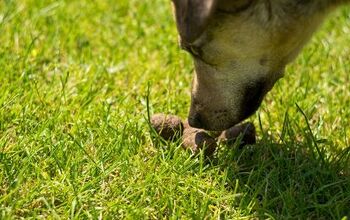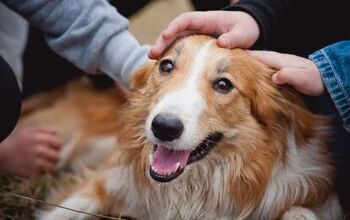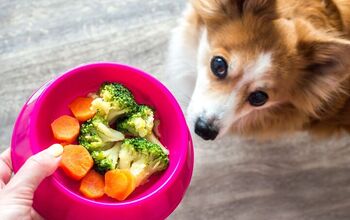Expert Insight: Dr. Marty Becker and Winter Pet Wellness Tips

Dr. Marty Becker is a household name in the pet industry. Not only does he know what he’s talking about when it comes to pet health, but he’s also one of the most down-to-earth, up-for-anything kind of guy you’ll meet.
I was fortunate enough to meet the famous vet at a pet industry trade show. He was promoting a pet TV network, and a mutual PR friend set up a meeting. I have no recollection of anything he said about the network – what I do remember… and still talk about… is our mutual fondness for fondling chicken breasts.
I know it sounds weird, because, really, it is weird. Let me just reassure you that it had everything to do with an awesome chicken harness and a photo-opt that was too good to pass up (please see below).
But talking about pet health is what Dr. Marty Becker does best (A close second are his skills at feeling up a chicken). And I jumped at the opportunity to talk to him about keeping your dog healthy during the winter.
Winter can be a tough time on dogs and humans, especially when it comes to diet and keeping a healthy body weight. Here’s what the good doctor has to say about winter wellness and keeping positive over these dreary months:
Q: During the colder months, what should owners do to promote a healthy and active lifestyle with their dog?
A: There’s no “bikini season” for dogs; they need to be in great shape year-round. And so do we – despite the temptation to pack on the pounds and hibernate until spring. Fortunately, having a dog is a great asset in trying to keep fit ourselves. After all, we might resist our own conscience telling us to get out of bed and exercise, but it’s a lot harder to resist those puppy dog eyes begging for a walk in the winter wonderland outdoors. Try these tips to keep yourself and your dog healthy all winter long:
- Review Your Pet’s Diet
Whether your pet is at a healthy weight or needs to lose a few pounds, pet owners should take a look at the food their dog is currently eating and consider a healthy weight management formula or a veterinary weight-loss diet.
To help your dog maintain or lose weight, be sure to also:
- Completely cut out table scraps from your pet’s diet.
- Make sure treats comprise no more than 10% of your pet’s daily caloric intake.
- Work with your veterinarian to make a comprehensive, customized plan for your pet. Because when it comes to your dog’s size, one size definitely doesn’t fit all!
- Get Creative Indoors and Outdoors
I live in Northern Idaho, so there are plenty of days when getting out with the dogs feels more like a chore than a joy. One of my biggest motivators? Just what mischief they’ll get into with all that pent-up energy! We all need to get acclimated once temperatures drop, but after that, and with the proper gear for dogs who need it, outdoor walks and playtime should continue year-round. In fact, winter play can be even more fun! Try building an agility course or maze in the snow in your yard. If the weather really is too terrible, try finding an indoor gym for dogs. Puzzle feeders, balls and tuggers are also a great option for keeping your dog busy on a long, cold winter day.
Q: I’ve noticed that my dog tends to lick his paws a lot more in the winter? Why would he do this and what can I do to help him?
A: Your dog might be licking his paws for a number of reasons. One is boredom – another reason to get out and hit the trails in all but the worst weather! The other is the paws are irritated from snow, ice, and products used to melt ice. Dogs’ skin, much like a human’s, will dry out and become itchy or cracked from winter weather. Antifreeze and rock salt can also cause dryness and irritation to a dog’s paws, and can be toxic if ingested.
Therefore, it’s worth considering a pet-friendly moisturizer to soothe your dog’s paws. After applying it to her paws, keep him busy with a puzzle feeder or treat so he won’t lick it off.
You can also try preventing dryness, cracked paws or irritation by putting your dog in booties or by cleaning off the pads of his feet every time he comes inside. And be sure to use only paw-safe ice-melting products on your own property.
Q: Should I be adding any extra supplements to my dog’s diet in the winter? If so which ones and why?
Even when a dog’s diet may be nutritionally complete and balanced, some supplements can provide a benefit to dogs with certain health issues. If your dog has special nutritional needs, your veterinarian can help you decide what supplement plan may be right for you.
However, if your dog is eating a nutritionally balanced diet regardless of what season it is, excess supplements could mean wasted vitamins, or worse, vitamin toxicity. Understanding your dog’s unique dietary needs will help you make the best decisions regarding his food and need for supplements. Talk to your veterinarian to see if supplements might be needed for your dog.
Q: How can a dog help lift your spirits in these dreary months, especially if you suffer from SAD (seasonal affective disorder)?
There is nothing like a pooch to take the “sad” out of SAD! Many studies and research have found that general petting and interacting with your pet can create a surge in hormones such as endorphins, oxytocin, prolactin and serotine, the hormones that make us feel positive and happy. That’s why the more you engage with your pet, the better you feel!
Get moving! According to a survey conducted by Purina in 2016, nearly two in three (65%) dog owners believe having a pet makes them more motivated to exercise, compared to only 18% of non-dog owners. Whether it’s going for a quick walk, playing with your dog’s favorite ball or building an obstacle course indoors for your dog, the activity will make both of you feel great and motivated even on the chilliest of days.
Go on a new adventure. It’s easy to get stuck in a winter-time rut, or succumb to the urge to hibernate. Don’t do it! Even on days when the weather seems dull outdoors, finding new scenery and new locations are mentally stimulating for both you and your pet. It can also help your dog learn to adapt in new situations. Shop in a local dog-friendly store, or meet other dog lovers for an indoor play date.

Amy Tokic, Editor of PetGuide.com, is a passionate animal lover and proud pet parent of Oscar, a Shih Tzu/Chihuahua cross, and Zed, a Japanese Chin. Her love of animals began in kindergarten, when she brought her stuffed dog Snoopy into class with her every day. Now, she writes about her adventures in pet ownership and tirelessly researches products, news and health related issues she can share with other animal enthusiasts. In her free time, Amy loves perusing used book and record stores, obsessing over the latest pet products available and chasing squirrels with wild abandon (a habit attributed to spending too much time with her pooches).
More by Amy Tokic
























